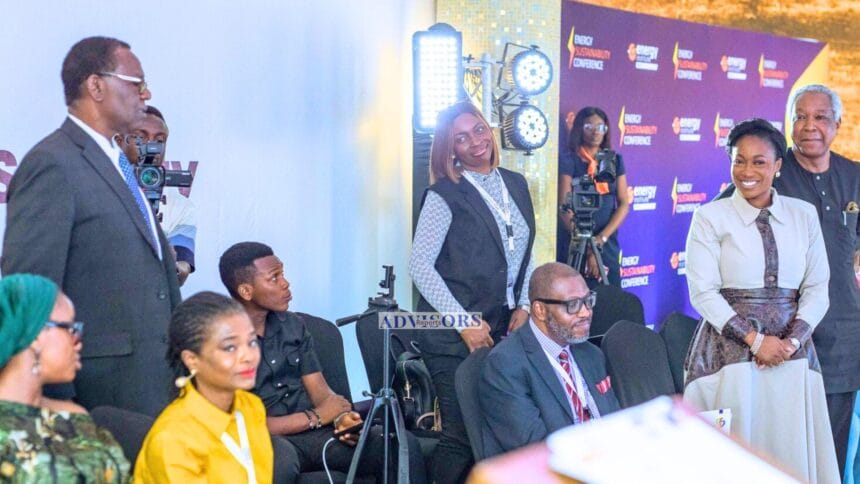Eromosele: Our energy sovereignty is under threat! Nigeria needs utility-scale solar plants, not mini-grids, to tackle energy poverty
Iledare: We need a balanced energy mix strategy to sustain economic growth, create jobs, transition to renewable energy responsibly, without external pressure dictating our priorities
Oredola Adeola
Victor Eromosele, Chairman/CEO of M.E. Consulting Limited, and Professor Wumi Iledare, Executive Director of the Emmanuel Egbogah Foundation, have urged the Nigerian government at all levels to adopt a more serious, pragmatic, and inclusive approach to energy strategy, emphasizing the need to leverage all energy sources to tackle energy poverty while addressing climate change.
The duo expressed concern over persistent obstacles hindering progress in the energy sector, citing excessive bureaucracy, a lack of robust indigenous technology, and flawed economic policies—particularly the recent Naira’s devaluation—as major factors undermining the gains expected from two decades of energy sector reforms.
Victor Eromosele, Chairman/CEO of M.E. Consulting Limited, remarked as moderator of a debate session at the recently concluded Energy Institute’s Energy Sustainability Conference, on the theme: “Is the Global Climate Agenda a Fair Pathway for Africa’s Development Needs, or a Threat to the Continent’s Energy Sovereignty?”
While Professor Wumi Iledare highlighted the need for a balanced energy mix strategy during his intervention at the session.
According to Chairman/CEO of M.E. Consulting Limited, “The way forward for Nigeria, is to embrace every energy option—traditional and renewable. We cannot afford to lose sight of our energy poverty or the global climate realities affecting us all.”
Eromosele warned that Nigeria’s current trajectory threatens its ability to achieve its net-zero carbon emissions target by 2060 and guaratees a sustainable energy future.
He said,”Our policymakers are blinded by selfish interests. We know the solutions but refuse to act decisively. If we’re serious about net-zero 2060, we need to wake up, stabilize the economy, and support scalable, sustainable energy solutions.”
Eromosele, has therefore called for urgent action to address Nigeria’s energy poverty, stabilize its foreign exchange rates, and prioritize large-scale renewable energy projects to ensure the nation’s economic and environmental sustainability.
“We must work harder to make things work. It’s time for serious action, not excuses, if we want to achieve real progress,” he stated.
He said, “We’ve devalued the exchange rate countless times, but what has the country gained? We haven’t doubled or even quadrupled our exports, nor have we stabilized the Naira.
“Why is the exchange rate at N1,700 per dollar? It’s disheartening that those of us contributing significantly to the economy find ourselves poorer,” he said.
Speaking on the global push for renewable, Eromosele remarked, “The question is, should Africa abandon its God-given resources without meaningful reforms?
He said, “The truth is that Africa has always been on the receiving end, despite accounting for less than 4% of global CO2 emissions. Climate change is a global phenomenon—we are all experiencing its impacts, largely driven by emissions from polluters and developed economies.
He linked Nigeria’s broader economic challenges to climate change, pointing to its ripple effects across the region.
“The shrinking of Lake Chad—now just one-third of its original size—has displaced herders who migrate southwards into Nigeria’s Middle Belt, leading to violent conflicts. This is a climate issue that requires serious policy interventions. We need public policies to push back against the climate crisis while addressing energy poverty.”
“The counterargument, however, is that the weather doesn’t respect our circumstances. Floods are ravaging countries everywhere, and 2024 is predicted to be the hottest year on record, following 2023.
“Climate anomalies—like snow in Saudi Arabia, autumn wildfires in New Jersey, and even green-focused economies like Norway grappling with environmental crises—show the scale of the problem.”
Eromosele also referenced the Nairobi Declaration, a resolution adopted by African leaders aimed at pushing for a global carbon tax (GCT).
He explained that the tax declaration is expected to compel high-emitting nations to compensate lower-emitting countries for mitigation and adaptation efforts.
He said, “Will the world agree to a global carbon tax? That’s the big question. As COP29 approaches, we hope to see whether the Nairobi Declaration gains traction or simply fades into obscurity.”
Speaking about Nigeria’s energy challenges and the impact of bureaucracy on energy initiatives, Victor Eromosele highlighted the country’s declining oil production, noting its stagnation at around 1.4 million barrels per day over the past two decades compared to the 2.3 million barrels per day achieved in December 2015.
“We cannot understand why production remains insufficient. Is it due to a lack of reforms or investment? These are critical questions we need to answer if we are to move forward,” he emphasized.
He described Nigeria’s focus on its “Decade of Gas” initiative as long overdue, noting the slow pace of implementation and the nation’s broader struggles to upscale renewable energy.
“We have significant issues with renewable energy adoption, and now we’re trying to scale up gas.
“Meanwhile, we remain indecisive about whether to prioritize made-in-Nigeria diesel and petrol or continue relying on imports.
“Over 53 million Nigerians are completely off the national grid—the largest number recorded in any single country worldwide.
“Since the privatization of Nigeria’s power sector a decade ago, the country has experienced 106 grid collapses, including recent incidents”
“We’re still paying tariffs on solar panels and not fully supporting local production of made-in-Nigeria solar panels. In every sector, there are roadblocks to progress,”
“These failures underline the lack of seriousness from policy makers,” he stated.
Eromosele further emphasized that bureaucracy is stifling the industry—whether in traditional energy or energy transition, both are in trouble.”
Commenting on the Nigeria’s longstanding delaying in actualsing major hydro projects in the country, Eromosele said, “Hydropower is a renewable energy source, and if we were serious, this would have been a major focus.”
Expressing frustration at the decades-long delays in completion of Mambilla Hydropower Plant project, Eromosele said, “Mambilla has been on the drawing board for over three decades. If completed, it could have been one of the largest hydropower plants in Africa, delivering large-scale, affordable energy. Yet, despite continuous budget allocations, we’ve made little progress.”
Eromosele also cautioned against over-reliance on natural gas, noting its limitations as a fossil fuel.
“Fossil fuels, including natural gas, have their drawbacks. While gas is part of the energy mix, it cannot be the sole solution. We need to embrace every available energy source to address our energy poverty.”
The Chairman/CEO of M.E. Consulting Limited, lamented over the country’s missed opportunities in renewable energy and the country’s lack of progress in utility-scale solar power, comparing it to other African nations.
He said, “Under Babatunde Fashola’s tenure as Minister of Power, utility solar companies were set up. But as is typical, the initiative was abandoned.
“Meanwhile, Egypt has developed one of the largest solar farms in the world—large enough to power Nigeria. Senegal has completed four utility-scale solar plants, yet Nigeria has none, despite having abundant sunshine. It’s a glaring failure for a country that claims to be the ‘Giant of Africa.'”
Eromosele dismissed the focus on mini-grid solutions as insufficient for addressing Nigeria’s energy crisis.
“Mini grids might work for small villages, but they’re not scalable for a country of over 200 million people. They are short-term fixes that do not align with our economic needs or strengths.
“Utility-scale solar plants, like those in Angola, are quicker to optimize and scalable. But we’ve wasted time and resources on policies that don’t match the scale of our energy demands.”
“The country’s devalued exchange rate has made solar imports prohibitively expensive while local solar panel manufacturers receive little or no support.
“We’ve made it so costly to import solar components, yet we fail to support our local manufacturers. Angola has already completed two utility-scale solar plants, showing it’s possible to make significant progress with the right policies,”Eromosele said.
Professor Wumi Iledare, Executive Director of the Emmanuel Egbogah Foundation for Petroleum and Energy Industry Economics and Policy Advocacy, in his intervention, explained that coal remains a dominant contributor to global power generation, even as the world transitions toward sustainable energy.
He stressed the importance of leveraging technology, economic planning, and sound public policies to achieve sustainable energy goals.
“Sustainable energy is the future, and that future is here. It’s time to embrace it, not just for today but for the decades to come.
“A comprehensive energy mix strategy is key, and African leaders must resist being swayed by Western aid and grants that dictate how we approach our energy challenges,” he said.
Drawing lessons from South Africa’s electricity utility crisis, Iledare warned African nations to avoid similar pitfalls by prioritizing long-term planning and diversification in energy sources.
“The crisis in South Africa’s electricity utility is a cautionary tale. We cannot afford to repeat such mistakes. Our energy mix strategy must be robust and meticulously pursued—it is the foundation for energy security and economic growth.”
Addressing Nigeria’s challenges, Iledare said, “The biggest challenge is not manpower development but manpower deployment. Policies crafted for personal gains have undermined the sector’s growth.
“It’s not enough to have electricity at home while 60-70% of the population remains jobless. The energy crisis is stifling manufacturing and exports, which are vital for economic development.”
While he acknowledged the importance of renewable energy, Iledare cautioned against abandoning fossil fuels prematurely, noting that renewables alone cannot yet address Nigeria’s pressing energy needs.
“Renewables cannot solve our immediate problems, particularly energy poverty and unemployment. The global train of energy transition is moving, but we must be pragmatic. Fossil fuels remain essential to our economic stability. If we shift focus entirely to renewables now, we risk significant setbacks.”
Iledare has therefore called for pragmatic energy policies that balance the need for renewables with the realities of Nigeria’s reliance on fossil fuels.
“We don’t have the luxury to abandon fossil fuels just yet. A balanced energy mix strategy will enable us to sustain economic growth, create jobs, and transition to renewable energy responsibly. It’s about being prepared and staying the course without external pressure dictating our priorities,” he stated.




